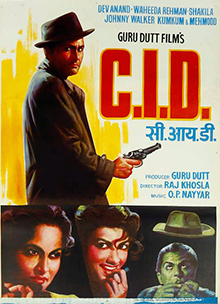
Dev Anand was an Indian actor, writer, director and producer known for his work in Hindi cinema. Anand is considered as one of the greatest and most successful actors in the history of Indian cinema. Through a career that spanned over six decades, he worked in more than 100 films. Anand is a recipient of four Filmfare Awards, including two for Best Actor. The Government of India honoured him with Padma Bhushan, Indian third highest civilian honour in 2001 and with Dadasaheb Phalke Award in 2002.

Rahul Dev Burman, known professionally as R.D. Burman, was an Indian music director and actor, who is considered to be one of the greatest and most successful music directors of the Hindi film music industry. From the 1960s to the 1990s, Burman composed musical scores for 331 films, bringing a new level of music ensemble with his compositions. Burman did his major work with legendary singers Lata Mangeshkar, Asha Bhosle, and Kishore Kumar. He also worked extensively with lyricist Gulzar, with whom he has some of the most memorable numbers in his career. Nicknamed Pancham, he was the only son of the composer Sachin Dev Burman.

Omkar Prasad Nayyar was an Indian film music composer, singer-songwriter, music producer, and musician. He is considered to be one of the most rhythmic and melodious music directors of the Hindi film industry. He won the 1958 Filmfare Award for Best Music Director for Naya Daur. Nayyar worked extensively with singers Geeta Dutt, Asha Bhosle, Mohammed Rafi, though not with leading Bollywood female singer Lata Mangeshkar.

Guru Dutt was an Indian film director, producer, actor, choreographer, and writer. He is regarded as one of the greatest filmmakers of Indian cinema.
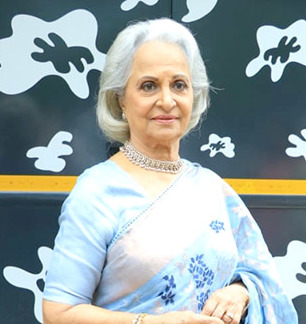
Waheeda Rehman is an Indian actress. Regarded as one of Hindi cinema's most accomplished actresses, she has worked in more than 90 feature films, in a career spanning over five decades. Her accolades include a National Film Award and three Filmfare Awards. She was honoured with India's civilian awards; the Padma Shri in 1972 and the Padma Bhushan in 2011. In 2021 she was honoured with the Dadasaheb Phalke Award, India's highest award in the field of cinema, but was awarded in 2023.

Sadhana Shivdasani, known mononymously as Sadhana, was an Indian actress who worked in Hindi films. Regarded as one of the finest actresses of Indian cinema, Sadhana was noted for her exquisite beauty and trend-setting fashion statements. She was popularly known as "The Mystery Girl" for her stint as the "mystery girl" in the suspense thriller trilogy films directed by Raj Khosla during the mid 1960s.

Trishul (transl. Trident) is a 1978 Indian Hindi-language action drama film, directed by Yash Chopra, written by Salim–Javed and produced by Gulshan Rai. It features music by Mohammed Zahur Khayyam, with lyrics by Sahir Ludhianvi. The film features an ensemble cast of Shashi Kapoor, Sanjeev Kumar, Amitabh Bachchan, Raakhee Gulzar, Hema Malini, Poonam Dhillon, Sachin and Waheeda Rehman.
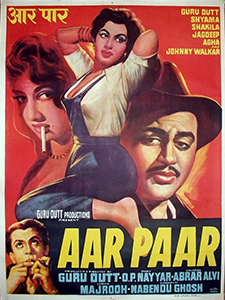
Aar Paar is a 1954 Indian Hindi-language noir comedy film. Directed by Guru Dutt, it has music by O.P. Nayyar and lyrics by Majrooh Sultanpuri. Aar-Paar stars Johnny Walker, Shyama, Shakila, Jagdeep, Jagdish Sethi. Raj Khosla and Atma Ram, Guru Dutt's brother assisted Guru Dutt in film direction.

Raj Khosla was one of the top directors, producers and screenwriters in Hindi film industry from the 1950s to the 1980s. He was known for bringing in "neo-noir" and style in Indian cinema, and also as a "women's director" because he showcased actresses at their best. He has given many successful films with Dev Anand. Starting his career under Guru Dutt, he went on to make hit films like, C.I.D. (1956), Woh Kaun Thi? (1964), Mera Saaya (1966), Mera Gaon Mera Desh (1971), Dostana (1980) and Main Tulsi Tere Aangan Ki (1978), the last of which won the Filmfare Award for Best Film. His early background in classical music ensured that most of his films excelled in music.

Guide is a 1965 Indian bilingual romantic drama film directed by Vijay Anand and produced by Dev Anand, who co-starred in the film with Waheeda Rehman. Based on R. K. Narayan's 1958 novel The Guide, the film narrates the story of Raj (Anand), a freelance tour guide and Rosie (Rehman), the repressed wife of a wealthy archaeologist.
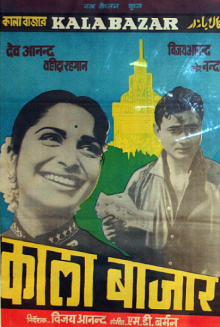
Kala Bazar is a 1960 Hindi crime film produced by Dev Anand for Navketan Films. Written and directed by Dev's younger brother Vijay Anand, the film starred Dev Anand, Waheeda Rehman, Vijay Anand, Chetan Anand, Nanda, Rashid Khan, Madan Puri, Leela Chitnis, Mumtaz Begum and Helen. S.D. Burman composed the music, while the lyrics were penned by Shailendra.

The Guru Dutt team is a group of filmmakers formed by Guru Dutt for some of his works. Some well-known films that the team created include Chaudhvin Ka Chand, Sahib Bibi Aur Ghulam, Kaagaz Ke Phool, and Pyaasa. In 2005 Pyaasa was ranked among the top 100 movies by Time magazine.
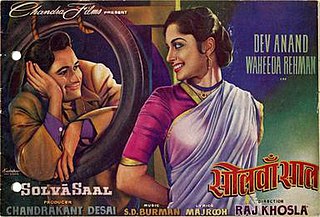
Solva Saal is a 1958 Hindi movie. Produced by Chandrakant C. Desai, the film is directed by Raj Khosla. The film stars Dev Anand and Waheeda Rehman. The film's music is by Sachin Dev Burman and the lyrics by Majrooh Sultanpuri.
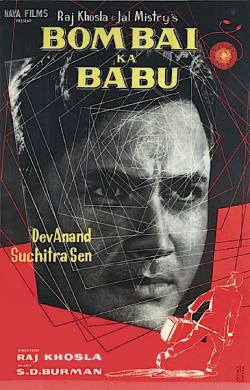
Bombai Ka Babu is a 1960 Hindi film directed by Raj Khosla and written by Rajinder Singh Bedi. The film stars Dev Anand and Suchitra Sen in a rare appearance in Hindi cinema.

Shakila was an Indian actress, best known for her roles in Guru Dutt's films: Aar Paar (1954) and C.I.D. (1956).
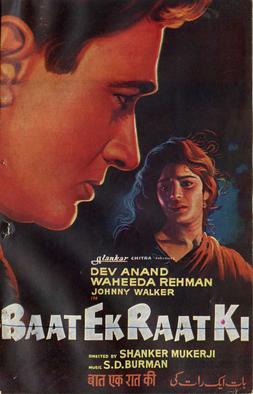
Baat Ek Raat Ki is a 1962 Hindi film directed by Shankar Mukherjee, starring Dev Anand, Waheeda Rehman and Johnny Walker.

Jyoti Bane Jwala is a 1980 Indian Hindi-language action film, produced by Prasan Kapoor and written and directed by Dasari Narayana Rao. It stars Jeetendra, Vinod Mehra, Waheeda Rehman, Moushumi Chatterjee, Sarika in the pivotal roles and music composed by Laxmikant–Pyarelal. The film is a remake of the Telugu film Katakataala Rudraiah.

12 O'Clock is a 1958 Bollywood Thriller and Mystery film starring Guru Dutt, Waheeda Rehman and Rehman. It was produced by G.P. Sippy and directed by Pramod Chakravorty. It was listed in Best Bollywood Noirs of 1950s by Filmfare, citing, While Guru Dutt is as effective as ever and Waheeda looks suitably grief-stricken and confused, the film belongs to Rehman, who plays Bani's manipulative brother-in-law to perfection.
Bhappi Sonie was an Indian film director and producer, in Hindi cinema. He is best known for Shammi Kapoor and Dharmendra hit films, Janwar (1965) and Brahmachari (1968), and also won Filmfare Award for Best Film.

Conversations with Waheeda Rehman is a biography by the producer of television documentaries and author Nasreen Munni Kabir, documenting Kabir's extensive conversations with the actress Waheeda Rehman about the actress' life and career. The biography details Rehman's birth in 1938 in Chingleput, her 54-year-long film career, and her 1974 marriage to the actor Kamaljeet, with whom she has two children. It was published on 19 February 2014 by Penguin Books. The book generated positive reviews from book critics; most of the praise was directed towards the book's question-and-answer format, and Kabir's and Rehman's style in questioning and answering, respectively.
